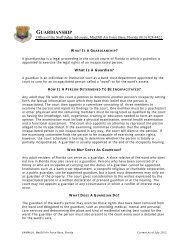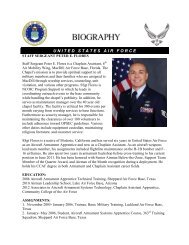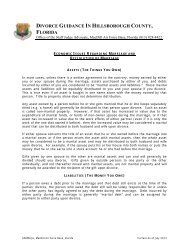FLORIDA'S HOMESTEAD EXEMPTION - MacDill Air Force Base
FLORIDA'S HOMESTEAD EXEMPTION - MacDill Air Force Base
FLORIDA'S HOMESTEAD EXEMPTION - MacDill Air Force Base
Create successful ePaper yourself
Turn your PDF publications into a flip-book with our unique Google optimized e-Paper software.
FLORIDA’S <strong>HOMESTEAD</strong> <strong>EXEMPTION</strong><br />
Office of the Staff Judge Advocate, <strong>MacDill</strong> <strong>Air</strong> <strong>Force</strong> <strong>Base</strong>, Florida (813) 828-4422<br />
WHAT IS A <strong>HOMESTEAD</strong> <strong>EXEMPTION</strong>?<br />
The Florida Constitution exempts from forced sale by creditors certain homestead real<br />
property and $ 4,000 in personal property. The equity value of real property that can be<br />
protected is unlimited. This exemption is provided to protect and preserve the interest of<br />
the family in the family home, increase family stability, provide a refuge from economic<br />
misfortunes, and encourage property ownership and individual financial independence.<br />
"Homestead" is liberally defined and includes mobile homes, boats, cooperative units, and<br />
recreational vehicles. Generally, there are three exceptions to which the homestead<br />
exemption does not apply: (1) taxes and assessments on the home; (2) obligations<br />
contracted for the purchase, improvement, or repair of the home; and (3) obligations<br />
contracted for house, field, or other labor performed on the home.<br />
In the unfortunate event of the death of a spouse or parent, Florida’s constitution and<br />
accompanying statutes prevent the home and limited personal property from being included<br />
within the probate estate of the recently deceased person (called the “decedent”) when the<br />
property owner is survived by a spouse or lineal descendants (i.e., children, grandchildren,<br />
etc.). As such, the exemption protects the home from forced sale, judgments against, or<br />
liens upon the property usually sought to satisfy outstanding debts of the decedent.<br />
By exempting the homestead, the Florida Constitution actually protects such property in<br />
three different ways; not only does it (1) protect the homestead against forced sale to<br />
satisfy the decedent’s creditors, but it also (2) provides the homestead with a limited<br />
exemption from taxes, and it furthermore (3) places certain restrictions on a homestead<br />
owner from alienating or devising the property. The homestead exemption does not<br />
absolve the decedent’s estate from his debts, however; it merely prevents creditors from<br />
forcing the sale of his house to relieve those debts and shields his surviving family from his<br />
financial misfortune. In doing so, it promotes the stability and welfare of the state in<br />
general.<br />
Source: Fla. Const. Art. X, § 4 (2010)<br />
WHAT PROPERTY DOES THE <strong>EXEMPTION</strong> APPLY TO?<br />
The actual definition of “homestead” varies depending on the context in which it is used, as<br />
well as the disposition of the property. If the home and the real property upon which it is<br />
settled are within a municipality, up to one-half acre, including the residence is protected.<br />
If outside an incorporated municipality, the protected property and residence includes up to<br />
160 acres of contiguous land. Additionally, in either case, up to $4000 of the decedent’s<br />
personal property is also exempt from creditors as well as $1000 for the decedent’s vehicle<br />
which can be combined with the personal property exemption to equal $5000 in<br />
exemptions. Determination of what specifically qualifies as the homestead may require a<br />
petition to the court. The character of property as a homestead depends upon the owner's<br />
actual intention to reside there as the permanent place of residence, coupled with the fact<br />
of residence. The exemption may be claimed only when the owner of the homestead<br />
property is a resident of Florida. Source: Fla. Const. Art. X, § 4 (2010). Note: if the real<br />
6AMW/JA, <strong>MacDill</strong> <strong>Air</strong> <strong>Force</strong> <strong>Base</strong>, Florida Current As of July 2012
property is owned by the decedent and surviving spouse in tenancy by the entirety, then<br />
the homestead is not subject to the constitutional exemption. Fla. Stat. § 731.201 (2010).<br />
HOW DOES THE <strong>HOMESTEAD</strong> PROVISION AFFECT SALE OR MORTGAGE OF REAL ESTATE?<br />
When the homeowner is married, the Florida Constitution requires the spouse to be joined<br />
in a mortgage, sale, or gift of the property for such a conveyance or disposition to be valid.<br />
If the spouse is not included, the conveyance may be considered invalid or ineffectual, and<br />
the homestead will automatically pass outside of probate to the spouse upon the owner’s<br />
death. The Florida Constitution does not prevent an unmarried property owner from selling,<br />
mortgaging, or devising the homestead by gift.<br />
Also, when the homestead owner is survived by a spouse and the homestead has not been<br />
sold during the owner’s lifetime, the decedent cannot devise the property by will to any<br />
person other than the spouse. Such a devise will be considered invalid, regardless of the<br />
intent of the decedent.<br />
Source: Fla. Const. Art. X, § 4 (2010)<br />
HOW DOES THE <strong>HOMESTEAD</strong> <strong>EXEMPTION</strong> AFFECT MY PROPERTY TAXES?<br />
As mentioned, the homestead exemption also allows for a property tax exemption. This tax<br />
exemption, however, does not exclude the owner from special assessments and federal tax<br />
liability, and several variables determine the amount of the exemption to which one is<br />
entitled. Of course, the amount of the exemption may not exceed the assessed value of the<br />
property.<br />
Every person who owns and resides on real property in Florida on January 1 of the<br />
application year, and who makes the property their permanent residence is eligible to<br />
receive a homestead exemption up to $50,000. The first $25,000 applies to all property<br />
taxes, including school district taxes. The additional exemption up to $25,000 applies to the<br />
assessed value between $50,000 and $75,000 and only to non-school taxes.<br />
If one spouse holds the title, the other spouse may file for the exemption with the consent<br />
of the titleholder.<br />
If filing for the first time, be prepared to answer these questions:<br />
1. In whose name or names was the title to the dwelling recorded as of January 1?<br />
2. What is the street address of the property?<br />
3. How long have you been a legal resident of the State of Florida? (A Declaration<br />
of Domicile or Voter's Registration will be proof of date before January 1.)<br />
4. Do you have a Florida license plate on your car and a Florida driver's license?<br />
5. Were you living in the dwelling on January 1?<br />
Source: Fla. Const. Art. VII, § 6 (2010)<br />
Every person who is entitled to homestead exemption in this state and who is serving in any<br />
branch of the Armed <strong>Force</strong>s of the United States, shall file a claim for such exemption as<br />
required by law, either in person, or, if by reason of such service he or she is unable to file<br />
such claim in person he or she may file such claim through his or her next of kin or through<br />
any other person he or she may duly authorize in writing to file such claim.<br />
6AMW/JA, <strong>MacDill</strong> <strong>Air</strong> <strong>Force</strong> <strong>Base</strong>, Florida Current As of July 2012
Fla. Stat. § 196.071 (2010).<br />
Furthermore, partially or totally disabled veterans may be entitled to a discount on top of<br />
the exemption. To qualify, the veteran must be over 65 years of age, the disability must be<br />
combat-related, the veteran must have been a resident of Florida at the time s/he entered<br />
military service, and the veteran must have been honorably discharged. The discount<br />
percentage is equal to the percentage of the veteran's permanent, service-connected<br />
disability as determined by the United States Department of Veterans Affairs. To qualify for<br />
the discount, an applicant must submit to the county property appraiser, by March 1 of a<br />
given year, proof of residency at the time of entering military service, an official letter from<br />
the United States Department of Veterans Affairs stating the percentage of the veteran's<br />
service-connected disability and such evidence that reasonably identifies the disability as<br />
combat related, and a copy of the veteran's honorable discharge. If the property appraiser<br />
denies the request for a discount, the appraiser must notify the applicant in writing of the<br />
reasons for the denial, and the veteran may reapply. The Legislature may waive the annual<br />
application requirement in subsequent years.<br />
Source: Fla. Const. Art. VII, § 6 (2010)<br />
Additionally, an ex-service member disabled at least 10% in war or by service connected<br />
misfortune may be entitled to a $5,000 exemption on any property owned by the ex-service<br />
member. The un-remarried surviving spouse of such a disabled ex-service member who, on<br />
the date of the disabled ex-service member's death, had been married to the disabled exservice<br />
member for at least 5 years is also entitled to the exemption. Fla. Stat. § 196.24<br />
(2010).<br />
Clients should call the local tax assessor's office or visit its website to obtain useful<br />
information for estimating future taxes and for obtaining the exemption.<br />
The material in this handout represents general legal advice. The law is continually<br />
changing; although the information in the handout was current as of the date it was drafted,<br />
some provisions in this pamphlet may have changed. It is always best to consult an<br />
attorney about your legal rights and responsibilities regarding your particular case.<br />
6AMW/JA, <strong>MacDill</strong> <strong>Air</strong> <strong>Force</strong> <strong>Base</strong>, Florida Current As of July 2012
















